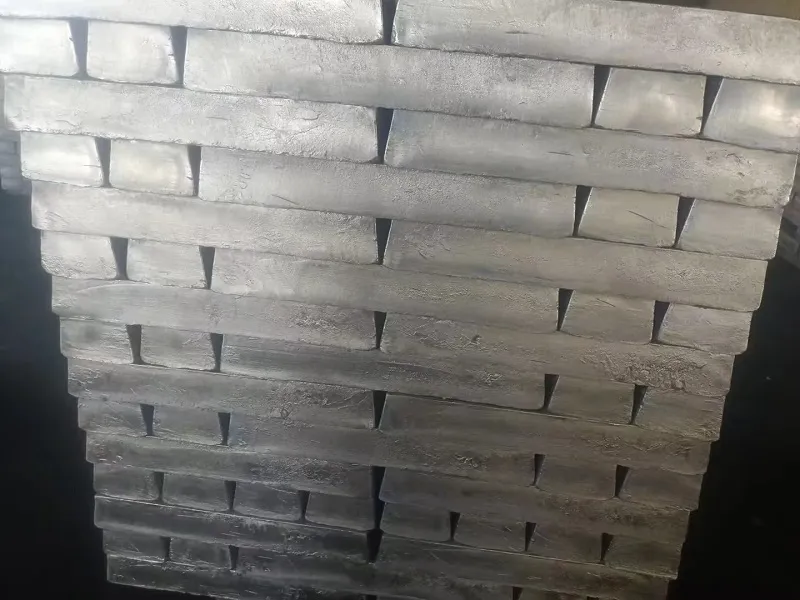1. Product introduction of Magnesium Alloy Ingots
Magnesium alloy ingots are essential raw materials used in various industries due to their unique properties and advantages. These ingots are formed by melting and casting magnesium alloys, which are mixtures of magnesium with other elements like aluminum, zinc, and manganese. The resulting ingots possess remarkable characteristics that make them highly sought after in modern manufacturing processes.

2. Product features of Magnesium Alloy Ingots
1). Lightweight: Magnesium is the lightest structural metal, making the alloy ingots ideal for applications where weight reduction is crucial, such as in the automotive and aerospace industries.
2). High Strength-to-Weight Ratio: Despite their low weight, magnesium alloys exhibit impressive strength-to-weight ratios, providing excellent structural integrity and durability.
3). Corrosion Resistance: These alloys possess natural corrosion resistance, making them suitable for outdoor applications and ensuring longevity even in harsh environments.
4). Good Heat Dissipation: Magnesium alloys have superior thermal conductivity, making them well-suited for heat dissipation applications, such as in electronics and power transmission.
5). Ease of Machining: Magnesium alloy ingots offer excellent machinability, allowing for complex and precise manufacturing processes.
6). Recyclability: Magnesium is fully recyclable, aligning with the increasing demand for eco-friendly and sustainable materials.
3. Product Advantages of Magnesium Alloy Ingots
1). Automotive Industry: The automotive sector extensively utilizes magnesium alloy ingots to reduce vehicle weight, enhance fuel efficiency, and improve overall performance.
2). Aerospace Industry: Magnesium alloys find applications in aircraft components and aerospace structures, contributing to weight reduction and improved fuel consumption.
3). Electronics: These alloys are employed in electronics and consumer devices for their heat dissipation properties, ensuring efficient cooling of sensitive components.
4). Medical Devices: Magnesium alloys are biocompatible and are utilized in medical implants and devices.
5). Sports Equipment: Sporting goods manufacturers utilize magnesium alloys to create lightweight and durable equipment like golf clubs and tennis rackets.
4. Applications of Magnesium Alloy Ingots
1). Automotive Components: Magnesium alloy ingots are used to produce engine blocks, transmission cases, wheels, and other parts in the automotive industry.
2). Aerospace Parts: In the aerospace sector, magnesium alloys are employed in aircraft frames, engine components, and structural elements.
3). Electronics: Magnesium alloy ingots are utilized in laptops, smartphones, and other electronic devices to dissipate heat and improve overall performance.
4). Medical Implants: These alloys are used to manufacture biocompatible medical implants like bone screws and plates.
5). Power Tools: Magnesium alloy ingots are employed in the production of lightweight and durable power tool casings.
5. Company Profile
Chengdingman is one of the well-known brands in the magnesium ingot industry, known for its high-quality and customized products. As a wholesale magnesium ingot supplier, Chengdingman provides various magnesium alloy ingots to meet the diverse needs of customers. Using advanced technology and expertise, Chengdingman ensures that its ingots are manufactured to the highest standards. Whether you are looking for a specific alloy or need a custom solution, Chengdingman is committed to providing customers with reliable custom products.
6. FAQ
Q: Are magnesium alloy ingots flammable?
A: Magnesium itself is highly flammable, but the alloy ingots are less prone to catch fire due to the presence of other elements that increase their ignition temperature. However, proper safety measures must be taken during handling and processing.
Q: Can magnesium alloy ingots replace aluminum in all applications?
A: While magnesium alloys offer weight savings and good strength, they may not be suitable for all applications. In some cases, aluminum or other materials might be preferred based on specific requirements like cost, performance, and environmental factors.
Q: What are the challenges in using magnesium alloy ingots?
A: Magnesium alloys can be more expensive than some traditional materials. Additionally, they require careful handling during processing to avoid the risk of ignition and need protection from corrosive environments.
4. Are magnesium alloy ingots environmentally friendly?
Magnesium alloys are considered more environmentally friendly than certain materials, such as lead or plastics, as they are fully recyclable and have a lower carbon footprint. However, the environmental impact depends on the overall manufacturing process and energy sources used.